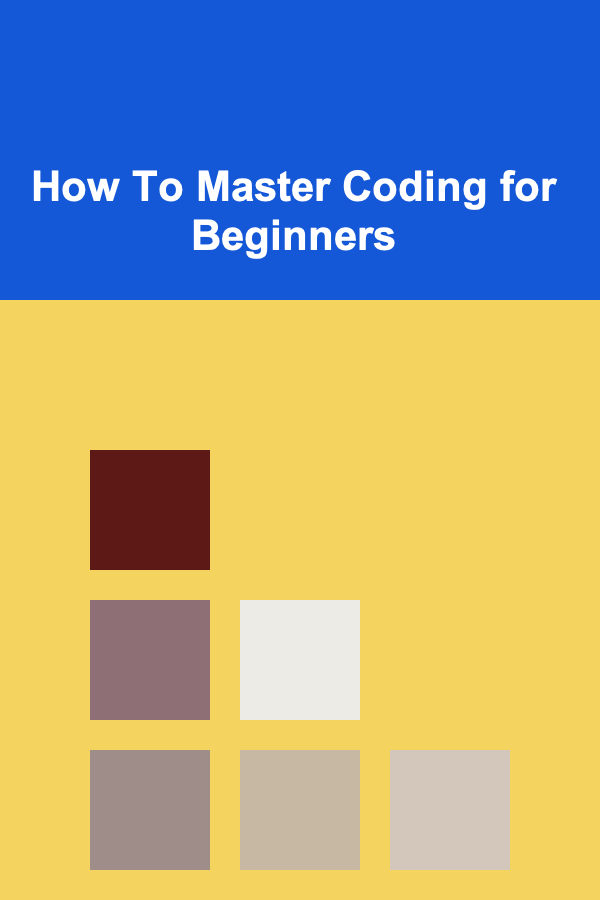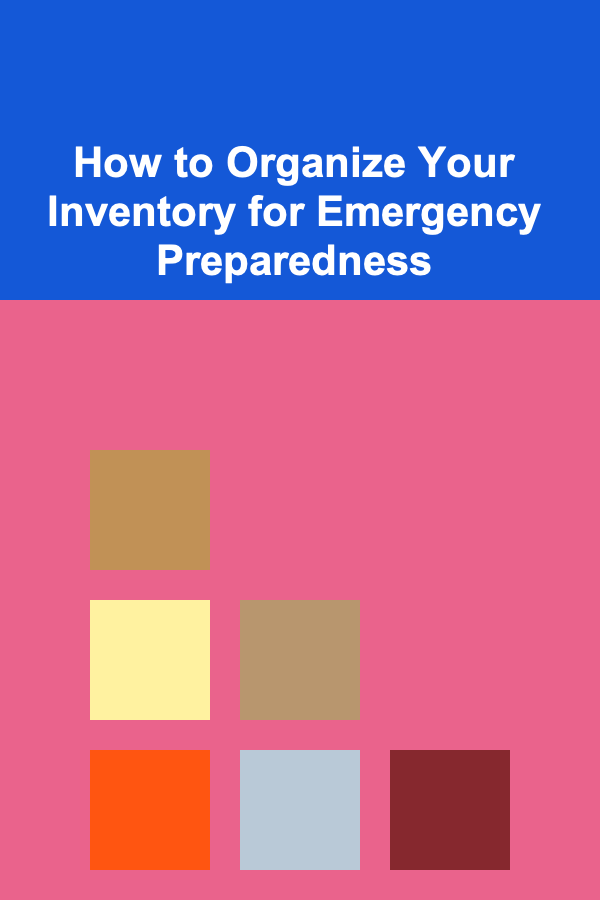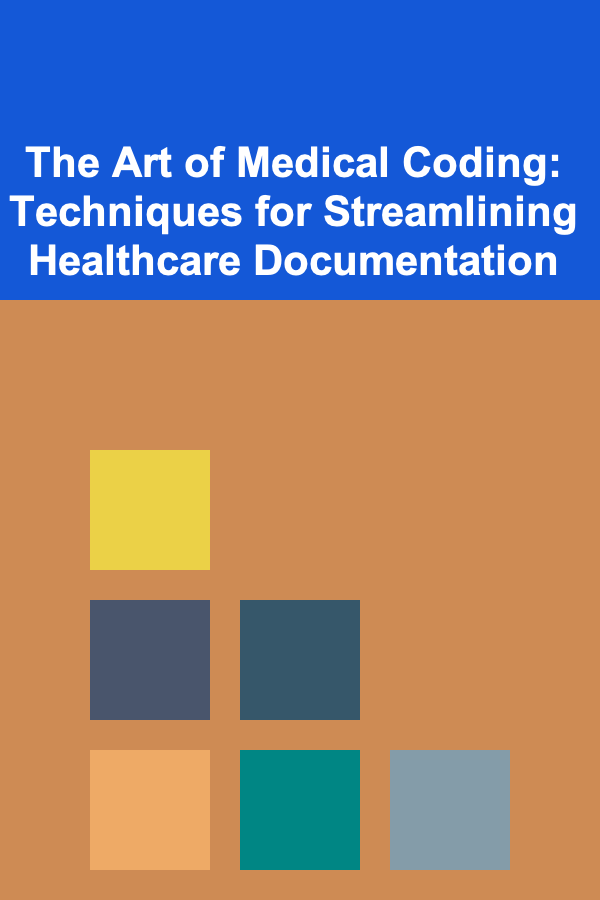
How To Master Coding for Beginners
ebook include PDF & Audio bundle (Micro Guide)
$12.99$5.99
Limited Time Offer! Order within the next:

Coding, once considered a niche skill, is now a cornerstone of nearly every industry, from healthcare and finance to entertainment and technology. In the digital age, the ability to code is one of the most powerful skills you can acquire. However, for beginners, learning how to code can seem overwhelming. It requires patience, dedication, and a systematic approach to truly master.
In this article, we will break down the process of mastering coding into manageable steps. We will provide insights into how beginners can get started, the best practices for learning, common challenges, and ways to overcome them. By the end of this guide, you'll have a clear path forward in your coding journey, no matter what language you choose to learn.
Understanding the Basics of Coding
Before diving into the specifics of coding, it's crucial to understand what coding really is. At its core, coding (also called programming) is the process of instructing a computer to perform specific tasks through written code. These instructions are written in programming languages, which are a set of rules and syntax used to communicate with the computer.
Common Programming Languages for Beginners
There are several programming languages that are well-suited for beginners. Each has its strengths and weaknesses, depending on the kind of projects you want to work on. Here are some of the most common choices for beginners:
- Python: Known for its readability and simplicity, Python is an excellent language for beginners. It's widely used in fields like data science, web development, automation, and artificial intelligence.
- JavaScript: JavaScript is essential for web development. If you're interested in creating websites or web apps, learning JavaScript is almost a must. It's a versatile language that also has frameworks like Node.js for backend development.
- HTML/CSS: Although not technically programming languages, HTML and CSS are the foundational languages of the web. HTML structures the content of web pages, and CSS styles it. Learning these languages is a great entry point for web development.
- Ruby: Ruby is another beginner-friendly language that focuses on simplicity and ease of use. It's particularly known for its Rails framework, which is a popular choice for building web applications.
- Scratch: For younger beginners or those who prefer a visual, block-based approach, Scratch is an excellent way to learn the logic of coding without having to deal with syntax right away.
The Importance of Algorithmic Thinking
Coding isn't just about memorizing syntax; it's about developing problem-solving skills. When you write code, you are essentially solving a problem by breaking it down into smaller, manageable steps. This requires logical thinking and the ability to identify patterns.
One of the most crucial aspects of coding is algorithmic thinking---thinking in steps and breaking down complex problems into simple solutions. For beginners, focusing on algorithmic thinking is more important than worrying about the specific syntax of a language at the start.
Set Clear Goals and Choose a Path
When you're just starting out, it's easy to feel overwhelmed by the vast world of programming. To stay on track, you need to set clear goals for what you want to achieve with coding. Do you want to build websites, create apps, analyze data, or automate tasks?
Define Your Goal
Setting specific goals will help you focus your learning efforts. For example:
- Web Development: If your goal is to build websites, focus on learning HTML, CSS, JavaScript, and potentially a backend language like PHP or Node.js.
- Data Science: If you're interested in data science, focus on Python, learn about libraries such as Pandas, NumPy, and Matplotlib, and explore tools like Jupyter notebooks.
- App Development: If you want to create mobile apps, you might want to learn Swift (for iOS) or Kotlin (for Android).
- Game Development: If you're passionate about creating games, consider learning Unity with C# or exploring Unreal Engine with C++.
By choosing a path early on, you can avoid the confusion that comes with spreading yourself too thin. Focus on one area, and once you become proficient, you can expand your skillset.
Break Down Your Goals Into Achievable Milestones
For beginners, setting long-term goals can seem daunting. It's essential to break them down into smaller, manageable tasks. For example, if your goal is to learn web development, your milestones might include:
- Learn basic HTML and CSS to build simple static web pages.
- Master JavaScript to add interactivity to websites.
- Learn about web frameworks like React or Angular for advanced web development.
Focusing on these incremental steps allows you to measure your progress and stay motivated as you move toward your ultimate goal.
Learn by Doing: Hands-On Coding
The best way to learn how to code is by writing code. Reading tutorials, watching videos, or attending lectures is useful, but nothing beats hands-on experience. Start small by working on basic problems, and gradually take on more complex projects as your skills improve.
Practice Coding Every Day
Consistency is key when learning to code. It's better to practice for 30 minutes every day than to cram for hours once a week. By dedicating a small portion of your day to coding, you reinforce the concepts you're learning and build muscle memory for the syntax.
Here are a few practical ways to practice coding:
- Coding Challenges: Websites like LeetCode, HackerRank, and Codewars offer coding challenges that allow you to practice solving problems in various programming languages.
- Projects: As soon as you feel comfortable, start building your own projects. They don't have to be complicated at first---perhaps a simple to-do list or a personal portfolio website---but they will give you the opportunity to apply your knowledge.
- Contribute to Open Source: Once you're ready, contributing to open-source projects is a great way to practice coding and gain real-world experience.
Use Online Coding Platforms
Online coding platforms like Codecademy, freeCodeCamp, and Khan Academy offer interactive lessons that guide you through coding exercises. These platforms often provide immediate feedback, allowing you to quickly identify and correct mistakes.
Understand the Tools of the Trade
While learning the syntax of a programming language is essential, mastering the tools that help you write and debug code is just as important. As a beginner, it's essential to familiarize yourself with the following tools:
Text Editors and IDEs
A text editor or Integrated Development Environment (IDE) is where you write your code. Some popular text editors and IDEs include:
- VSCode: Visual Studio Code is one of the most popular code editors. It's lightweight, fast, and supports a wide variety of programming languages.
- PyCharm: PyCharm is an excellent IDE for Python developers. It comes with features like code completion, error detection, and debugging tools.
- Sublime Text: Sublime Text is another widely used text editor known for its speed and simplicity.
Version Control: Git and GitHub
As you work on more significant projects, you'll need a way to track changes in your code and collaborate with others. Git, a version control system, helps you keep track of changes to your codebase, while GitHub provides an online platform for hosting your projects.
Git allows you to:
- Commit changes to your codebase.
- Collaborate with others through branches and pull requests.
- Roll back to previous versions of your code if something goes wrong.
GitHub is where many open-source projects are hosted and is an excellent tool for showcasing your work.
Debugging Tools
Learning how to debug your code is an essential skill for every programmer. As a beginner, you will make mistakes---that's just part of the learning process. Debugging tools help you find and fix errors in your code. Most IDEs come with built-in debuggers, but there are also standalone tools available.
Join Coding Communities
Learning to code can sometimes feel isolating, but you don't have to do it alone. Joining a coding community can be incredibly beneficial. There are many online forums, meetups, and coding communities where beginners can ask questions, share their work, and get advice.
Here are a few coding communities to consider joining:
- Stack Overflow: A go-to resource for coding questions. You can search for answers or ask your own questions.
- GitHub: Aside from being a place to host your code, GitHub is also a great community for connecting with other developers.
- Reddit: Subreddits like r/learnprogramming are great for beginners. You can ask questions, share projects, and connect with others on the same journey.
- Discord Servers: Many coding-related Discord communities are dedicated to helping beginners. They offer real-time advice and support.
Participating in Coding Meetups
As you gain confidence in your coding abilities, consider attending coding meetups or hackathons. These events are a great way to network with other programmers and get hands-on experience by collaborating on projects.
Embrace the Learning Curve
One of the hardest aspects of learning to code is accepting the fact that progress takes time. Don't get discouraged if you feel stuck. Every programmer has been there. The key is persistence and resilience.
Don't Fear Failure
Failure is a part of the process. When your code doesn't work, it's not a reflection of your abilities; it's an opportunity to learn. Debugging and solving problems are what make you a better coder.
Learn from Your Mistakes
Every time you encounter an error or bug, take the time to understand why it happened. Did you misunderstand the problem? Did you forget a syntax rule? Understanding the root cause of your mistake will help you avoid making the same error in the future.
Conclusion
Mastering coding as a beginner may seem like a monumental task, but with the right mindset and approach, it's entirely achievable. Start by understanding the basics, setting clear goals, and practicing consistently. Focus on learning by doing, use the right tools, and seek support from coding communities. Lastly, embrace the learning curve and recognize that failure is part of the journey.
As you progress, you'll find that coding becomes an invaluable skill that can open doors to countless opportunities in the tech industry and beyond. Keep learning, stay curious, and most importantly, enjoy the process. The world of coding is vast, and the possibilities are endless!

How To Learn Bodyboarding: Riding Waves Prone
Read More
How to Organize Your Inventory for Emergency Preparedness
Read More
Simple Ways to Start Cutting Back on Eating Out and Cooking More at Home
Read More
The Art of Medical Coding: Techniques for Streamlining Healthcare Documentation
Read More
How to Manage Cash Flow for Profitability
Read More
How To Manage Anger Effectively
Read MoreOther Products

How To Learn Bodyboarding: Riding Waves Prone
Read More
How to Organize Your Inventory for Emergency Preparedness
Read More
Simple Ways to Start Cutting Back on Eating Out and Cooking More at Home
Read More
The Art of Medical Coding: Techniques for Streamlining Healthcare Documentation
Read More
How to Manage Cash Flow for Profitability
Read More